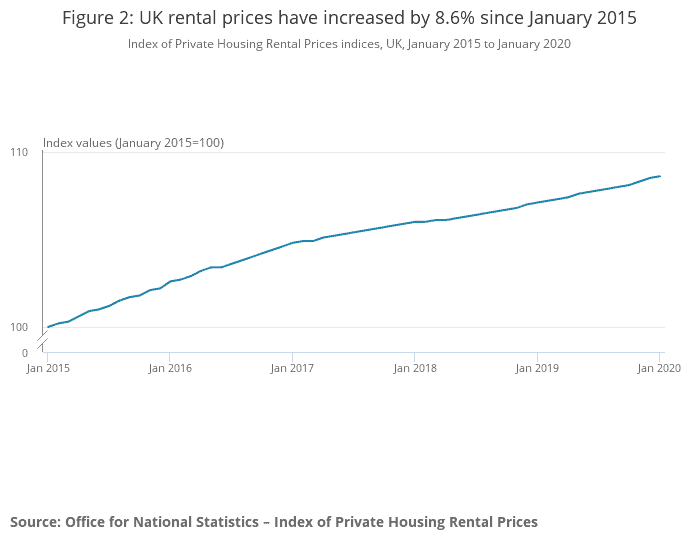There are rules which need to be followed with regards to increasing the amount of rent you charge your tenant(s). Like any other business, landlords should review their income and expenditure on an annual basis as a minimum, so it’s important landlords understand the correct procedures.
Landlords cannot increase the rent during the fixed term of an Assured Shorthand Tenancy (AST), unless the agreement specifically includes a ‘rent review clause’. Landlords can increase the rent when either the fixed term period ends, or prior to the start of a new AST agreement.
The cost of the rent must always be included within the tenancy agreement. Typically, landlords consider increasing the rent at the start of a new AST based on ‘market rates’.
If a landlord advertises their rent above the current market rate, they may have problems finding tenants that will agree to pay the increased rate, unless there are additional features and benefits which other comparable properties in the area do not offer.
If you have a tenancy agreement with a tenant and the fixed term of the AST has ended, but you would like to continue letting your property to your tenant, you do not need to do anything because the tenant will still be bound by the terms of the agreement.
When a fixed term ends, the AST rolls into a periodic tenancy on a week-by-week or month-by-month basis. If you would like to increase the rent at this point you have two options:
- Issue a Section 13 Notice Tenancy Form 4 which is accessible on the government website. (Can only be used once in any 52 week period)
- Produce a new AST which would allow you to amend other areas of the agreement and not just the rent
Any new increases to the rent is to start on the same day of the month that the rent is due. For example, if the rent is due on the 20th of each month, then the new increased rent amount should also be due on the 20th of each month.
Contents
Notice Period Required To Increase The Rent
The amount of notice that you are required to give your tenant(s) for raising the rent will depend on the length of the tenancy agreement, before the rent increase can take effect.
| Length Of Tenancy | Minimum Notice To Tenant |
| Monthly, Fortnightly and Weekly | 1 month’s notice |
| Between 1 and 11 months | One period of the tenancy |
| 1 year | 6 month’s notice |
If you find yourself in a position where you need to make arrangements to increase the rent, I would always advice giving the tenant as much notice as possible.
If the tenant doesn’t agree to the increase in rent, you will have more time to arrange viewings for other prospective tenants at the new rate, before the current tenant vacates.
Viewings will need to be coordinated with the sitting tenant with at least a 24 hour notice period before each viewing.
Reasons For Not Increasing The Rent
There are several reasons and benefits to not increasing the rent when the fixed term period ends:
- The tenant has not caused any problems and has always paid their rent on time
- Your expenses for the running and maintenance of the property have not drastically increased
- The current market rates have remained the same
There is something to be said for not increasing the rent if your tenant has not caused any problems and has always paid the rent on time. I would much rather keep a good tenant than risk losing them by increasing the amount of the rent.
There is always a risk that the next tenant will not be as good, plus it could take some time to find another tenant which could result in your property standing empty.
A void period of only 1 month could be more costly to your bottom line by losing a good tenant, than increasing your rent. Especially if you use an agent to market the property with the associated setup fees that having a new tenant would bring.
Why Would A Landlord Raise The Rent?
The most likely reason a landlord would increase the rent, is that the annual running and maintenance costs have increased. The other likely reason is that the current market rate has increased, although landlords will often overlook this in favour of keeping a good tenant.
There are a couple of other areas which are less common, but can have an influence on the landlord making a decision to increase the rent.
Although improvements to the property are more likely to occur between tenancy agreements, they can happen during an agreement to. If the landlord has made significant costly improvements to the property during a tenants tenure, then it could be reasonable for the landlord to prepose an increase in rent.
I personally wouldn’t carryout any significant improvements to a property with the idea of increasing the rent once the work is complete, without first discussing it with the tenant.
I would rather seek agreement with the tenant to have the work carried out during their occupancy, and consider compensating them for any disturbance, so that the improvement is in place for a future tenant should the current one leave. This will help reduce the amount of the potential void period.
The other likely event that could cause an increase to the rent, is an increase to taxes.
If a landlord incurs increased taxes on their expenses and/or income, they maybe forced to raise the rent to balance their losses. In business, it’s always the end user that pays the tax and in the private rented sector, the end user is the tenant.
How Much Can Rent Be Increased By?
Rents can only be raised in line with current market rates which tend to increase with inflation. The rental market rates typically increase between 0.5-5% annually, and can only be raised in agreement with both the landlord and the tenant once per year, unless agreed otherwise within the AST.
For a tenant paying £1,150.00 per month in rent, a 0.5% increase would raise the monthly rent payment to £1,155.75. An increase of 5% would take the new monthly rent payment to £1,207.50.
What Is The Average Increase In Rent Per Year?
The Office of National Statistics started The Index of Private Housing Rental Prices (IPHRP) in January 2011.
The IPHRP was introduced as an experimental price index to track the prices paid for renting a property from private landlords in Great Britain. It is frequently undergoing evaluation and advices that caution is exercised when drawing any conclusions.
The main points from the release dated 20 May 2020, states that rental prices rose by 1.5% in the UK during the past 12 months to April 2020.
Figure 2 on the release dated 19 February 2020 records an increase of rental prices to be 8.6% over a 5 year period between January 2015 and January 2020. That is an average increase of 1.72% per year.

Final Thoughts On Rent Increases
As a landlord, I value good tenants more than anything. I find that communication is key to maintain a good working relationship whether I’m in contact with the tenant direct or through an agent.
There are some tenants who move fairly frequently, but in my experience the majority prefer to settle for a while before they consider moving on.
Providing you maintain good communication and deal with any issues or repairs quickly and promptly, there will be fewer reason for your tenant to want to move.
So far, I have not found myself in a position where I have had to increase the rent on a sitting tenant. And given the choice, I would prefer to make an offer of a new fixed term agreement at the current rate to secure another period, rather than increase the rent.
Peace of mind knowing that the property will be occupied with a good tenant over the short to medium term, is more important to me than a few extra pounds in the immediate term.


